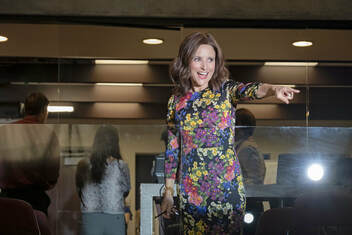 by Julian Spivey For seven seasons HBO’s “Veep” has been one of the funniest comedies on television and it’s done so while being the most callous, vile and mean-spirited political satire we’ve ever seen. This is probably why it’s been so successful because it’s dared to show the dirty side of politics that you rarely ever saw, at least when the show began in 2012. Julia Louis-Dreyfus’ stellar six-time Emmy-winning performance as Vice President, turned President, turned Presidential candidate Selina Meyer has always been that of somebody who would go to any lengths and do whatever it takes to achieve her dream of being elected President, stabbing all the backs along the way. Meyer may be one of the nastiest characters we’ve ever seen on television, but the performance is so strong and the writing of the series and character so perfect you can’t help but enjoy every second of it, even if she’s a character you may not actually root on to succeed. In the finale on Sunday, May 13, Meyer proved she would do just about anything to become President, of which she would first have to win her party’s nomination (the show did an excellent job for seven seasons never divulging what party she was a part of, which seems incredibly hard to have done, but had allowed the show to take aspects of both American major political parties and compile them into one candidate). She’s been television’s worst mother for years, but what she ultimately does to her daughter Catherine (played by Sarah Sutherland) just to receive another candidate’s endorsement is truly unforgivable – though not unbelievable to actually see in the real world. She goes against many of her political advisers who’ve had her back through all the good and many, many bad times at the convention by naming the incredibly buffoonish Jonah Ryan (played brilliantly by Timothy Simons, who I’m amazed hasn’t been nominated for an Emmy for this performance) as her Vice President. To be honest, I was almost certain “Veep” would end with Jonah winning the presidency as his character and his campaign were the most Donald Trumpish of any of the characters and storylines on the show, especially in its final season, which was the first for the series since the very early days of Trump’s presidency. Ultimately, the show opted for a better ending though by having Meyer win her party’s candidacy by any means necessary. The harshest thing Meyer does in the finale, and likely the series as a whole, is to turn her back on the one guy who’s never had anything bad to say about her – her bagman Gary Walsh, two-time Emmy-winner Tony Hale. It’s probably the most fitting way this story could’ve ended because it’s a moment – while not surprising – really shows the depths Meyer will go to to get what she wants. She’s a monster. One of television’s all-time greatest villains. And, this moment is the cherry on top. The final flash-forward of the episode was a nice touch to get to see where all these characters are many years into the future – people really don’t change, do they? Of all of the flash-forward moments the funniest was without a doubt Catherine’s. While Louis-Dreyfus and Hale get most of the headlines (and awards) for their exquisite performances in the series, “Veep” truly had the best ensemble cast of any comedy on television since “30 Rock” went off the air. The work of Anna Chlumsky, Gary Cole, Simons, Kevin Dunn, Sutherland, Clea DuVall, Reid Scott and Sam Richardson was all stunning throughout. It was also nice to see great turns from long-time recurring characters played by Hugh Laurie and Dan Bakkedahl – proving that the stunning writing and fully-fleshed out character didn’t just stop at the main cast. If I had a couple minor complaints about the final season of this great show the first would be the brevity of it only having seven episodes, whereas most series (all but the eight episode first season) had 10 episodes to more flesh out the storyline. The other complaint kind of has more to do with what’s happened with our real-world politics. For the show’s first five or six seasons it was obviously a satire of politics and felt more fun for it. But, especially in the final season the show became a bit more of a parody taking actual moments from the real world, especially the 2016 election cycle, and basically copying them straight-forward, specifically when it came to the Jonah character.
0 Comments
Leave a Reply. |
Archives
April 2024
|